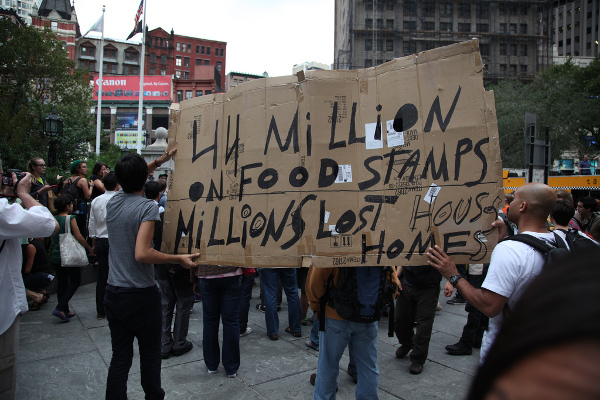
PHOTO/JIM KIERNAN
WASHINGTON, DC — On September 19, the U.S. House of Representatives approved legislation that would cut the food stamp program by nearly $40 billion over the next decade. President Obama has promised to veto the measure in the event it is passed by the Democrat-led Senate. But no matter what ends up happening in the ongoing battle over food stamps, come Nov. 1, more than 47 million beneficiaries will need to start doing more with less.
That date marks the scheduled end of the boost in food stamp funding provided by the 2009 American Recovery and Reinvestment Act. As a result, a family of three can expect to see $29 less per month in food assistance. The loss of assistance will leave families with roughly $1.40 per person to spend per meal, according to an analysis by the Center on Budget and Policy Priorities.
The reduction will have a real impact on poor families, say food advocates, who are trying to get out the word to the households they serve.
“On Nov. 1, things are going to get painful for families,” predicted Catherine Benvie, of D.C. Hunger Solutions.
In the District, more than 144,000 people participate in the program, up 3,353 beneficiaries (or 2.4 percent) from the previous year.
Nationally too, food stamp rolls have burgeoned since the 2008 recession. But the rapid growth in spending on the food stamp program, officially known as SNAP for Supplemental Nutrition Assistance Program, has prompted demands from conservatives for a sweeping overhaul.
The House vote to cut the program, through passage of legislation titled the Nutrition Reform and Work Opportunity Act, is being seen as a victory for Majority Leader Eric Cantor, a Virginia Republican.
In addition to deeply cutting spending for food stamps, the bill would restrict the ability of able-bodied childless adults to receive the benefits without meeting work requirements. It would also allow states to impose additional work and job training requirements on such beneficiaries.
Conservative supporters of the bill say such steps are necessary to reduce waste and fraud in the program.
|
Provide Food for all: With the wonderful technology being introduced every day into the productive process, we now have the abundance to feed, clothe, house and provide health care for every person on the planet. What stands in the way is a tiny class of corporate billionaires whose only motivation is maximum profits. The first step in solving the problem of hunger is to nationalize the giant food corporations and run them in the interests of the public. This will set conditions for creating a new cooperative society where everyone’s needs are met simply because they are a human being. ~People’s Tribune Editorial Board |
“The House Nutrition Bill will close up some loopholes. It gives to those who truly need it,” said Rachel Sheffield, a policy analyst at the Heritage Foundation. Yet at the same time, government statistics point to continuing problems with hunger across the country.
The Department of Agriculture just released information and a survey reporting that an estimated 14.5 percent of American households were food insecure at least some time during the year in 2012, “meaning they lacked access to enough food for an active, healthy life for all household members.”
And advocates for the poor say more spending on such programs is needed, not less. They said even the reduction scheduled to go into place Nov. 1 will take a serious toll.
“I think this will be hurtful for folks because they are used to having a certain amount of food in their homes and if just two dollars were cut, you would still actually see a difference in how much groceries you can buy,” said Reggie Black, a Street Sense vendor, writer, and activist.
Ramanda Lazaris is an Editorial Intern for Street Sense newspaper, DC

if any change must occur it is nessesary for the masses to feel the true nature of capitalism. This awakening will feed the need to consider that the illusion of the governemnt assistance, was only temporary. The only real change occured for a brief time. as long as we allow unjust laws to prevail while we dont even stand for whats right. were too busy fighting for another day to survive. Make a diffrence? how do we do that? Its very simple and effective. BOYCOTT: gas, products own by the maga corporations. (monsato). grow your own food if you can. but start with petroleum products first. very effective then once we have the attention that is the time to strike. protests only through organization is it possible to educate the masses to see the true nature of the institution schools, universies, prisons. One in the same designed to crush the human spirit and extinguesh any free will of the individual.